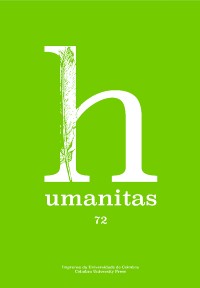Please use this identifier to cite or link to this item:
https://hdl.handle.net/10316.2/44775| DC Field | Value | Language |
|---|---|---|
| dc.contributor.author | Míguez Barciela, Aida | - |
| dc.date.accessioned | 2018-12-12T12:23:36Z | |
| dc.date.accessioned | 2020-10-03T19:28:04Z | - |
| dc.date.available | 2018-12-12T12:23:36Z | |
| dc.date.available | 2020-10-03T19:28:04Z | - |
| dc.date.issued | 2018 | - |
| dc.identifier.issn | 0871-1569 | - |
| dc.identifier.issn | 2183-1718 (PDF) | - |
| dc.identifier.uri | https://hdl.handle.net/10316.2/44775 | - |
| dc.description.abstract | Se propone una reconsideración de la llamada polémica antisofística a la luz de la crítica interna a los sabios tal como se plantea en la «Medea» de Eurípides. La oposición de las figuras protagonistas tiene que ver con el lema «sofístico» «hacer fuerte el decir débil». Se sostiene que, si bien el acto de Medea pone al decir débil en su sitio, o sea, en su condición dependiente y secundaria respecto al fuerte, la disolución –inherente tanto a la pretensión del sophistes como al proyecto polis– resulta irrefrenable. | spa |
| dc.description.abstract | This paper reconsiders the so called antisophistic polemic in the light of the intern critic of the new figures of the wise in Euripides’ «Medea». The opposition of the two protagonists is related to the sophistic motto «to make the weaker argument the stronger». I defend that, although the act of Medea puts the weaker argument in its proper place, i. e. in its dependent and secondary condition, the ruin and dissolution –attached to the pretension of the sophistes as well as to the polis itself– turns out to be unstoppable. | eng |
| dc.language.iso | spa | - |
| dc.publisher | Imprensa da Universidade de Coimbra | - |
| dc.rights | open access | - |
| dc.subject | Eurípides | - |
| dc.subject | sofistas | - |
| dc.subject | polis | - |
| dc.subject | riqueza | - |
| dc.subject | decir | - |
| dc.subject | Euripides | eng |
| dc.subject | sophists | eng |
| dc.subject | polis | eng |
| dc.subject | wealth | eng |
| dc.subject | speaking | eng |
| dc.title | Medea en el aire | por |
| dc.title.alternative | Medea in the air | por |
| dc.type | article | - |
| uc.publication.collection | Humanitas vol. 72 | - |
| uc.publication.firstPage | 23 | - |
| uc.publication.lastPage | 37 | - |
| uc.publication.location | Coimbra | - |
| uc.publication.journalTitle | Humanitas | - |
| uc.publication.volume | 72 | por |
| dc.identifier.doi | 10.14195/2183-1718_72_2 | - |
| uc.publication.section | Artigos | - |
| uc.publication.orderno | 2 | - |
| uc.publication.area | Artes e Humanidades | - |
| uc.publication.manifest | https://dl.uc.pt/json/iiif/10316.2/44775/262695/manifest?manifest=/json/iiif/10316.2/44775/262695/manifest | - |
| uc.publication.thumbnail | https://dl.uc.pt/retrieve/12061184 | - |
| item.grantfulltext | open | - |
| item.fulltext | With Fulltext | - |
| Appears in Collections: | HVMANITAS | |
Files in This Item:
| File | Description | Size | Format | |
|---|---|---|---|---|
| medea_en_el_aire.pdf | 572.32 kB | Adobe PDF |  |
Items in DSpace are protected by copyright, with all rights reserved, unless otherwise indicated.
